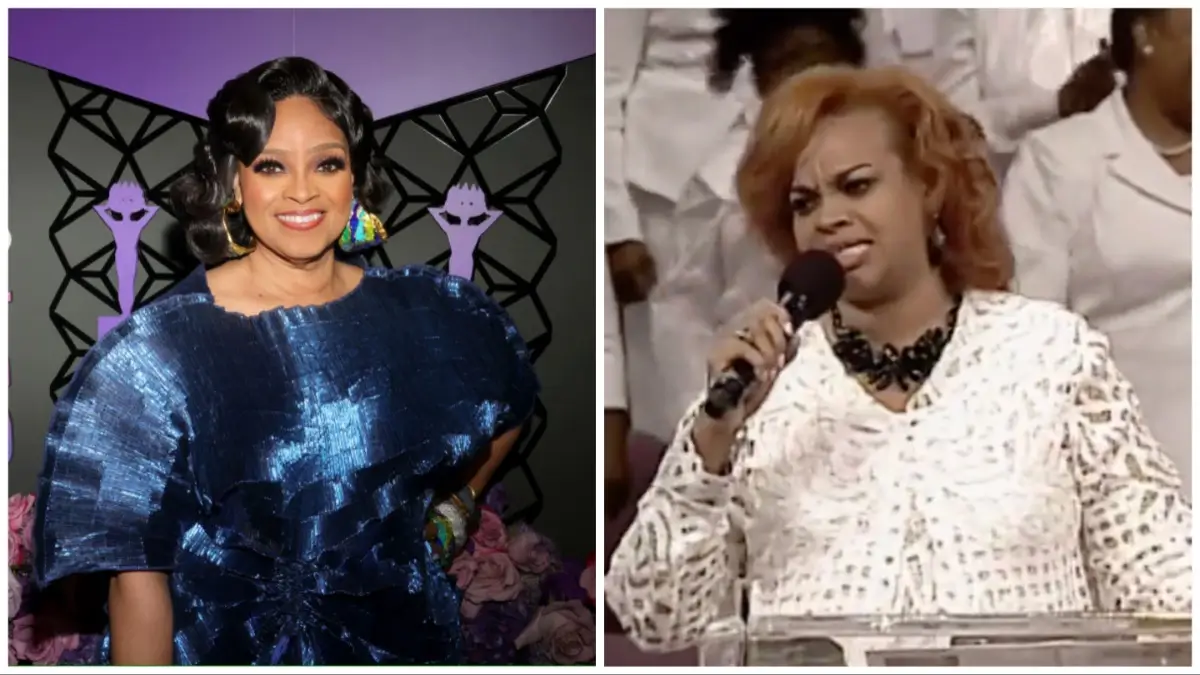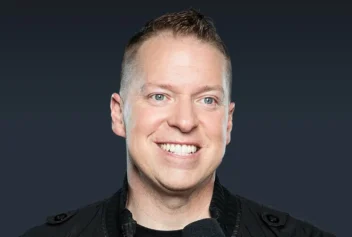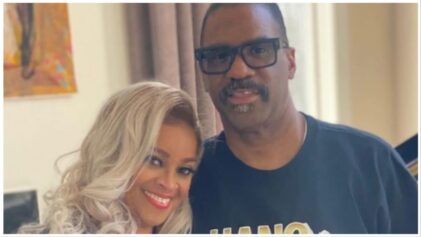Gospel artist and preacher Karen Clark Sheard has made a career out of preaching the word of God to the world in nontraditional ways.
As a trailblazer in contemporary gospel music, Clark Sheard, alongside her four sisters —Jacky Clark Chisholm, Denise “Niecy” Clark-Bradford, Elbernita “Twinkie” Clark, and Dorinda Clark-Cole — formed the iconic group The Clark Sisters under the guidance of their mother, Dr. Mattie Moss Clark.
The chart-topping quartet is widely credited for transforming gospel music and bringing it into the mainstream, and has been criticized over the years for being too worldly.
Recently, Clark Sheard’s unorthodox hermeneutic has revived the conversation of the family blending the sacred and the secular. But like a true Clark Sister, the soprano kept it classy and real about her approach to saving souls.

During an interview with Baller Alert, Clark Sheard was asked about a decade-old sermon where she said the N-word.
Reporter Ty Cole first shared that her sermons resonated with him, his family, and many others, then discussed a moment in her career that became a viral moment where she “expressed something so passionately that it caught everyone’s attention.” At first the singer was confused, not knowing what viral moment he was talking about.
“You were saying a sermon, and then at some point,” Cole explained before saying the expletive “fell out,” adding, “How do you feel about embracing moments like these that show your authentic human side… kind of breaking stereotypes without gospel figures are often perceived.”
The clip from a sermon called “Guess Who Is Coming to Dinner” was published on YouTube in 2012. In the beginning of the video, Clark Sheard admits that God has had to give her about “1,000” chances because of how imperfect she has been.
Around 12 minutes into the sermon, the Detroit native starts to talk about people being covered with anointing oil, asserting that those without it are bad news. Here she uses “oil” to represent the covering of a pastor or leadership in the church.
“You have some folk that ain’t got no oil on them and you got a fool with them kind of folk, you know, you got a fool with n—gas, I mean people,” she said.
She clarified, “All along they’ll blame everything on the pastor and the first lady but won’t look at themselves.”
While Cole and some others categorized Clark Sheard’s use of the n-word as accidental, it seems in the video that she was well aware of using the expletive to get a response from the crowd.
The viral clip of the moment did prompt responses from fans online after the interview clip was shared on Instagram. Mostly saying, “THERE WILL BE NO CLARK SISTERS SLANDER!!! Especially KCS!!!”
One person said, “Kirk Franklin can cuss his son out… Karen can say the N word… next subject. They are human.”
Another added, “Tuh she might be a gospel legend but them Detroit roots deep and [Ninjas] do be [Ninja-ing].”
A third comment read, “She didn’t say nothing wrong ! Please don’t play with Auntie Karen.”
Clark Sheard took the question in stride, answering it with the skill set of a veteran entertainer.
Diplomatically, she said that she tries to preach love and not judge people, directing the reporter to the meat of her sermon, “You got to let the word do the work.”
Eventually, she gave the reporter a bone, saying, “I just be careful because I don’t want to offend anybody.”
Fans were not offended, adding, “This is how our elders talk. And it worked because here we are talking about a sermon.”
Part of what has always endeared Clark Sheard and her sisters to the public is their down-to-earth nature.
Despite being viewed by some traditionalists as too secular early in their career, which sparked debates about the boundaries of gospel music, they boldly introduced elements of jazz, fusion, funk, disco, and R&B into their sound. They also pulled young people in with street language in their act.
People may not know but many R&B singers started in the church… it’s a different kind of sauce most def those sings hit differently🙌🏾And The Clark Sisters taught me how to sing soulful harmonies!🔥They are LEGENDS & TIMELESS👑 pic.twitter.com/abtrZZLxRx
— Missy Elliott (@MissyElliott) May 26, 2021
In fact, their unforgettable performances on “Soul Train,” and at Studio 54 in 1982 drew both acclaim and criticism, challenging the norms of gospel music. Those then-revolutionary moves paved the way for future generations of artists like Kirk Franklin, Mary Mary, Tamala Mann, Tye Tribbett, and so many more.
It is clear, pioneering in the spaces she was, that was not the first time she used the word.


